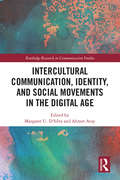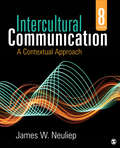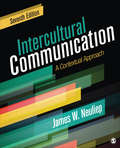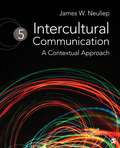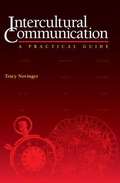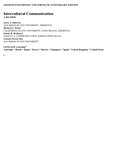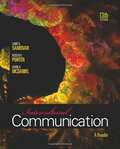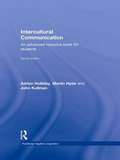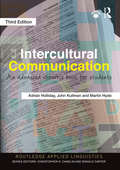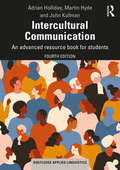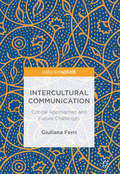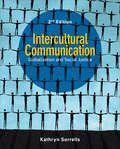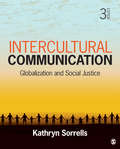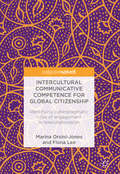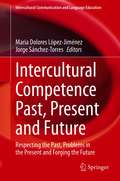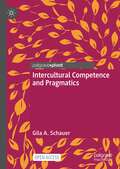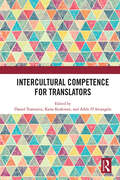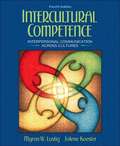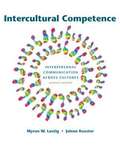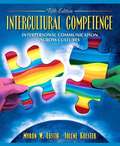- Table View
- List View
Intercultural Communication, Identity, and Social Movements in the Digital Age (Routledge Research in Communication Studies)
by Margaret U. D’Silva; Ahmet AtayThis book examines the complex and multidimensional relationship between culture and social media, and its specific impact on issues of identity and social movements, in a globalized world. Contemporary cyber culture involves communication among people who are culturally, nationally, and linguistically similar or radically different. Social media becomes a space for mediated cultural information transfer which can either facilitate a vibrant public sphere or create cultural and social cleavages. Contributors of the book come from diverse cultural backgrounds to provide a comprehensive analysis of how these social media exchanges allow members of traditionally oppressed groups find their voices, cultivate communities, and construct their cultural identities in multiple ways.This book will be of great relevance to scholars and students working in the field of media and new media studies, intercultural communication, especially critical intercultural communication, and academics studying social identity and social movements.
Intercultural Communication: A Contextual Approach
by James W. NeuliepIntercultural Communication: A Contextual Approach introduces students to the fundamental topics, theories, concepts, and themes of intercultural communication. Best-selling author James W. Neuliep presents a clear model for examining communication within a variety of contexts, including cultural, microcultural, environmental, sociorelational, and perceptual. Each chapter focuses on one context and explores the combination of factors within that context, including setting, situation, and circumstances. The updated Eighth Edition reflects the most recent research in the field and further incorporates the role of modern technology and its impact on intercultural communication. Included with this title: The password-protected Instructor Resource Site (formally known as SAGE Edge) offers access to all text-specific resources, including a test bank and editable, chapter-specific PowerPoint® slides.
Intercultural Communication: A Contextual Approach
by James W. NeuliepIntercultural Communication: A Contextual Approach introduces students to the fundamental topics, theories, concepts, and themes of intercultural communication. Best-selling author James W. Neuliep presents a clear model for examining communication within a variety of contexts, including cultural, microcultural, environmental, sociorelational, and perceptual. Each chapter focuses on one context and explores the combination of factors within that context, including setting, situation, and circumstances. The updated Eighth Edition reflects the most recent research in the field and further incorporates the role of modern technology and its impact on intercultural communication. Included with this title: The password-protected Instructor Resource Site (formally known as SAGE Edge) offers access to all text-specific resources, including a test bank and editable, chapter-specific PowerPoint® slides.
Intercultural Communication: A Contextual Approach
by Professor James W. NeuliepIn the fully updated Seventh Edition of Intercultural Communication: A Contextual Approach, bestselling author James W. Neuliep provides a clear contextual model (visually depicted by a series of concentric circles) for examining communication within cultural, microcultural, environmental, sociorelational, and perceptual contexts. Students are first introduced to the broadest context—the cultural component of the model—and progress chapter by chapter through the model to the most specific dimensions of communication. Each chapter focuses on one context and explores the combination of factors within that context, including setting, situation, and circumstances. Highlighting values, ethnicity, physical geography, and attitudes, the book examines means of interaction, including body language, eye contact, and exchange of words, as well as the stages of relationships, cross-cultural management, intercultural conflict, and culture shock.
Intercultural Communication: A Contextual Approach
by Professor James W. NeuliepIn the fully updated Seventh Edition of Intercultural Communication: A Contextual Approach, bestselling author James W. Neuliep provides a clear contextual model (visually depicted by a series of concentric circles) for examining communication within cultural, microcultural, environmental, sociorelational, and perceptual contexts. Students are first introduced to the broadest context—the cultural component of the model—and progress chapter by chapter through the model to the most specific dimensions of communication. Each chapter focuses on one context and explores the combination of factors within that context, including setting, situation, and circumstances. Highlighting values, ethnicity, physical geography, and attitudes, the book examines means of interaction, including body language, eye contact, and exchange of words, as well as the stages of relationships, cross-cultural management, intercultural conflict, and culture shock.
Intercultural Communication: A Contextual Approach (5th Edition)
by James W. NeuliepBased on the contextual model of intercultural communication, this text for a first undergraduate course features examples from an amazing variety of cultures, including Hmong, Amish, Navajo, and Arab American, as well as Latino, African American, and Japanese. The text introduces the need for intercultural communication, then covers cultural, micro-cultural, environmental, perceptual, and socio-relational contexts. There is also material on verbal and nonverbal codes, developing intercultural relationships, intercultural conflict, and intercultural communication in organizations. Learning features include discussion questions, self-assessments to assess student attitudes, and boxes offering student voices across cultures (new to this edition). This fifth edition offers several other new features: ethics questions, discussion of lesbian and gay culture, and a focus on the role of modern communication technology. Neuliep is affiliated with St. Norbert College. Annotation ©2012 Book News, Inc. , Portland, OR (booknews. com)
Intercultural Communication: A Practical Guide
by Tracy NovingerSuccessfully communicating with people from another culture requires learning more than just their language. While fumbling a word or phrase may cause embarrassment, breaking the unspoken cultural rules that govern personal interactions can spell disaster for businesspeople, travelers, and indeed anyone who communicates across cultural boundaries. To help you avoid such damaging gaffes, Tracy Novinger has compiled this authoritative, practical guide for deciphering and following "the rules" that govern cultures, demonstrating how these rules apply to the communication issues that exist between the United States and Mexico.
Intercultural Communication: A Reader
by Richard E. Porter Larry A. Samovar Edwin R. McDaniel Carolyn Sexton RoyThis new special, anniversary edition of INTERCULTURAL COMMUNICATION: A READER, celebrates 40 years of publication. In compiling this Fortieth Anniversary Edition, the editors reviewed over 600 articles from the previous 13 editions and selected those essays that educators, both in the United States and abroad, have considered foundational to intercultural communication teaching and research. These essays also illustrate the growth and direction of the field since the early 1970s. This edition offers a series of essays that enables students to gain an appreciation and understanding of intercultural communication. Material is presented in a context that assists students in comprehending and then applying course concepts to their lives.
Intercultural Communication: A Reader
by Richard E. Porter Larry A. Samovar Edwin R. McDanielThis eye-opening reader explores how communication values and styles can be similar or different for members of various cultures and communities. INTERCULTURAL COMMUNICATION: A READER focuses on practical strategies you can use to communicate more effectively in a variety of contexts, including interpersonal, rhetoric, group, business, education, health care, and organizational. This broad-based, highly engaging reader, compiled by the authors who defined the course, includes a balanced selection of articles--some commissioned solely for this text--that discusses the classic ideas that laid the groundwork for this field, as well as the latest research and ideas. Material is presented in such a way that you can read, understand, and then apply course concepts to your own life.
Intercultural Communication: A Reader (Sixth Edition)
by Richard E. Porter Larry A. SamovarExplores communication between cultures and how people approach communication differently.
Intercultural Communication: An Advanced Resource Book for Students
by Adrian Holliday John Kullman Martin HydeThe 2nd edition of Intercultural Communication: Updates key theories of intercultural communication Explores the ways in which people communicate within and across social groups around three themes. These include identity, Othering, and representation Contains new examples from business, healthcare, law and education. Presents an updated and expanded set of influential readings including James Paul Gee, James Lantolf, Les Back, Richard Dyer, Jacques Derrida and B Kumaravadivelu, with new critical perspectives from outside Europe and North America Written by experienced teachers and researchers in the field, Intercultural Communication is an essential resource for students and researchers of English Language and Applied Linguistics.
Intercultural Communication: An Advanced Resource Book for Students (Routledge Applied Linguistics #Vol. 1)
by Adrian Holliday John Kullman Martin HydeRoutledge Applied Linguistics is a series of comprehensive textbooks, providing students and researchers with the support they need for advanced study in the core areas of English language and Applied Linguistics. Each book in the series guides readers through three main sections, enabling them to explore and develop major themes within the discipline. • Section A, Introduction, establishes the key terms and concepts and extends readers’ techniques of analysis through practical application. • Section B, Extension, brings together influential articles, sets them in context, and discusses their contribution to the field. • Section C, Exploration, builds on knowledge gained in the first two sections, setting thoughtful tasks around further illustrative material. This enables readers to engage more actively with the subject matter and encourages them to develop their own research responses. Throughout the book, topics are revisited, extended, interwoven and deconstructed, with the reader’s understanding strengthened by tasks and follow-up questions. This highly-successful text introduces and explores the dynamic area of intercultural communication, and the updated third edition features: • new readings by Prue Holmes, Fred Dervin, Lei Guo and Summer Harlow, Miriam Sobré-Denton and Nilaniana Bardham, which reflect the most recentdevelopments in the field • refreshed and expanded examples and exercises including new material on the world of business, radicalisation and cultural fundamentalism • extended discussion of topics which include cutting-edge material on cosmopolitanism, immigrants’ intercultural communication and cultural travel • revised further reading. Written by experienced teachers and researchers in the field, Intercultural Communication, Third edition provides an essential textbook for advanced students studying this topic.
Intercultural Communication: An advanced resource book for students (Routledge Applied Linguistics)
by Adrian Holliday John Kullman Martin HydeIntercultural Communication provides a critical introduction to the dynamic arena of communication across different cultural and social strata. Throughout this book, topics are revisited, extended, interwoven, and deconstructed, with the reader’s understanding strengthened by tasks and follow-up questions. The fourth edition of this popular textbook has been updated to feature: ■ new readings by Kwame Antony Appiah, Yoshitaka Miike, Edward Ademolu and Siobhan Warrington, Helena Liu, and Michael Zirulnik and Mark Orbe, which reflect the most recent developments in the field; ■ refreshed and expanded examples and tasks including new material on an Asiacentric approach to intercultural communication, selfies as a global discourse, the impact on intercultural communication of English as a lingua franca in multinational organisations, and representations of Africa in charity media campaigns; ■ extended discussions of topics including intercultural training, voluntourism, challenging essentialism in business contexts, and intersectional approaches to identity; ■ revised further reading suggestions. Written by experienced teachers and researchers in the field, this fourth edition of Intercultural Communication is an essential textbook for advanced students studying this topic.
Intercultural Communication: Critical Approaches and Future Challenges
by Giuliana FerriDrawing on interdisciplinary theoretical perspectives, this book critically examines intercultural theory and its interrelations with globalisation, education and dialogue in multicultural societies. Applying the ethics of Emmanuel Levinas, the author repositions intercultural communication within a new paradigm that challenges static interpretations of self and other, and suggests future directions for the development of a post-methodological framework based on the decentring of the researcher. This innovative work will provide researchers and language teachers with the critical tools needed to challenge instrumentalist approaches to communication in a diverse global context, characterised by conflict and fear of the other and fresh insights to scholars of education, applied linguistics and sociology.
Intercultural Communication: Globalization and Social Justice
by Kathryn SorrellsIntercultural Communication: Globalization and Social Justice, Second Edition, introduces students to the study of communication among cultures within the broader context of globalization. Kathryn Sorrells highlights history, power, and global institutions as central to understanding the relationships and contexts that shape intercultural communication. Based on a framework that promotes critical thinking, reflection, and action, this text takes a social justice approach that provides students with the skills and knowledge to create a more equitable world through communication. Loaded with new case studies and contemporary topics, the Second Edition has been fully revised and updated to reflect the current global context, emerging local and global issues, and more diverse experiences.
Intercultural Communication: Globalization and Social Justice
by Kathryn SorrellsIntercultural Communication: Globalization and Social Justice, Second Edition, introduces students to the study of communication among cultures within the broader context of globalization. Kathryn Sorrells highlights history, power, and global institutions as central to understanding the relationships and contexts that shape intercultural communication. Based on a framework that promotes critical thinking, reflection, and action, this text takes a social justice approach that provides students with the skills and knowledge to create a more equitable world through communication. Loaded with new case studies and contemporary topics, the Second Edition has been fully revised and updated to reflect the current global context, emerging local and global issues, and more diverse experiences.
Intercultural Communication: Globalization and Social Justice
by Kathryn SorrellsWinner of the 2022 Textbook Excellence Award from the Textbook & Academic Authors Association (TAA) Intercultural Communication: Globalization and Social Justice introduces students to the study of communication among cultures within the broader context of globalization. Author Kathryn Sorrells highlights history, power, and global institutions as central to understanding the relationships and contexts that shape intercultural communication. Promoting critical thinking, reflection, and action, the text’s social justice approach equips students with the knowledge and skills to create a more equitable world through communication. The Third Edition includes new case studies, updated examples and statistics, and expanded discussions on timely topics, like the rise of ethnonationalism and white nationalism, and the impact of new media on global communication.
Intercultural Communication: Globalization and Social Justice
by Kathryn SorrellsWinner of the 2022 Textbook Excellence Award from the Textbook & Academic Authors Association (TAA) Intercultural Communication: Globalization and Social Justice introduces students to the study of communication among cultures within the broader context of globalization. Author Kathryn Sorrells highlights history, power, and global institutions as central to understanding the relationships and contexts that shape intercultural communication. Promoting critical thinking, reflection, and action, the text’s social justice approach equips students with the knowledge and skills to create a more equitable world through communication. The Third Edition includes new case studies, updated examples and statistics, and expanded discussions on timely topics, like the rise of ethnonationalism and white nationalism, and the impact of new media on global communication.
Intercultural Communicative Competence for Global Citizenship
by Marina Orsini-Jones Fiona LeeThis work builds on the assumption that language learning and teaching needs to be made more relevant to the 'glocalised' digital world we live in. Its authors argue that staff in Higher Education (HE) must prepare students for effective online interaction and explores the digital, linguistic and critical intercultural components of 'global citizenship'. The book pivots around an innovative research study; linguistic politeness frameworks are revisited to analyse the written online exchanges on an Online International Learning (OIL) - or intercultural telecollaborative - project between the UK and France. Through the use of cyberpragmatics, and inspired by Meyer and Land's 'threshold concept pedagogy', the authors examine the challenges and solutions identified by an 'expert student' in managing rules of engagement and intercultural awareness when interacting online. This book will appeal to students and scholars of applied linguistics, education, sociolinguistics and intercultural communication, and provide a valuable resource for teacher trainers, language teachers and educators across the world.
Intercultural Competence Past, Present and Future: Respecting the Past, Problems in the Present and Forging the Future (Intercultural Communication and Language Education)
by María Dolores López-Jiménez Jorge Sánchez-TorresThis book explores the benefits of teaching reflection upon one’s own culture to develop intercultural competence and looks into the relationship between the proficiency level of the second language and the target culture. It introduces new debates on the concept of ‘critical cultural awareness’ in intercultural learning and teaching, for example the indiscriminate use of terminologies related to the idea of ‘intercultural encounters’. Also, it provides insight into the relationship between language and culture using a new tool such as the Autobiography of Intercultural Encounters through Visual Media. The presentation of different approaches, tools, barriers, educational and cultural realities, online intercultural exchange projects and concepts such as motivation, attitudes, stereotyping, otherization, and critical cultural awareness makes this book an excellent instrument not only for teachers but also for researchers, policy-makers and private and public institutions that want to explore culture and interculturality and to promote an intercultural competence and global citizenship among its learners / users / clients and / or an interculturally-oriented language education.
Intercultural Competence and Pragmatics
by Gila A. SchauerThis Open Access book examines the link between intercultural competence (IC) and pragmatics by asking frontline modern foreign language teachers in higher education teaching a variety of languages (e.g., Dutch, English, French, German, Italian, Spanish, Swedish) how they conceptualise intercultural competence and which skills, competences and knowledge they consider important in their teaching contexts. The data were collected with an online survey that focused on the relationship between intercultural competence and pragmatics.While international organizations such as the United Nations Educational, Scientific and Cultural Organization (UNESCO) or the Council of Europe (CoE) agree that intercultural competence should play an important role in education, it is not always clear what IC may encompass in specific teaching contexts and subject areas. Examining how modern foreign language teachers in higher education conceptualise intercultural competence and the value they attach as well as the attention they give to various areas of pragmatics in their teaching is highly important, since those language professionals may be the final teachers learners encounter during their formal foreign language education. They are therefore in a unique position to shape modern foreign language learners’ intercultural and pragmatic awareness, competence and skills.This book will be of interest to language professionals, modern foreign language teachers and teacher trainers, as well as students and scholars of applied linguistics, pragmatics, and language education.
Intercultural Competence for Translators
by Kaisa Koskinen Daniel Tomozeiu Adele D’ArcangeloBy definition, translators are intercultural mediators. This book explores some of the most important current approaches in defining intercultural competence for translators. At the same time, it provides real-life examples of different approaches in operationalizing intercultural competence and teaching it in a translator-training context. Written for a global audience, the book provides an informative overview of the field as well as practical examples from different academic and cultural contexts. This book was originally published as a special issue of The Interpreter and Translator Trainer.
Intercultural Competence--Interpersonal Communication across Cultures
by Myron W. Lustig Jolene KoesterIn all of your personal and professional endeavors, you must learn to communicate with people whose cultural heritage makes them vastly different from you.
Intercultural Competence: Interpersonal Communication Across Cultures
by Myron W. Lustig Jolene KoesterIntercultural Competence provides students with the tools to succeed in today's intercultural world. Blending both the practical and theoretical, this text offers students the requisite knowledge, the appropriate motivations, and the relevant skills to function competently with culturally-different others. The text provides a discussion of important ethical and social issues relating to intercultural communication and encourages students to apply vivid examples that will prepare them to interact better in intercultural relationships. Learning Goals Upon completing this book, readers will be able to: Appreciate the impact of cultural patterns on intercultural communication Use both practical and theoretical ideas to understand intercultural communication competence Understand some of the central contexts - in health, education, business, and tourism - in which intercultural communication occurs Discuss cultural identity and the role of cultural biases.
Intercultural Competence: Interpersonal Communication Across Cultures (5th edition)
by Myron W. Lustig Jolene Koester"In this second half of the first decade of the twenty-first century, the world is vastly different from what it was a generation ago, or a decade ago, or even a few years ago. Technological innovations in communication, transportation, and various information tools have helped to create the greatest mixing of cultures that the world has ever seen. More than ever before, competence in intercultural communication is required for you to function well in your private and public lives; there is a very strong imperative for you to learn to communicate with people whose cultural heritage makes them very different from you. Our goal in this book is to give you the knowledge, motivation, and skills to accomplish that objective. ... The material we include in this book is guided as well by our strong belief that a textbook on intercultural communication needs to provide a healthy blend of the practical and the theoretical, of the concrete and the abstract."
